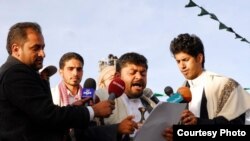Following three days of talks in the Saudi Capital, Riyadh, Arab leaders promised to redouble efforts to salvage Yemen's economy and end its war. However, as an Iranian ship approaches the Yemeni coast, and bombs continue to rain down on the capital, some analysts say the talks made little progress because they did not include all the players.
After a five-day cease-fire last week, the Saudi-led coalition resumed airstrikes in Yemen this week as an Iranian cargo ship approaches Yemeni waters. Iran says the ship carries humanitarian aid and it is expected to arrive Thursday or Friday.
Saudi Arabia has previously gone as far as bombing airports to prevent Iran from importing anything into Yemen, accusing Iran of supplying weapons to the Houthi rebels.
But even as tensions escalate, Arab leaders pledge to do everything in their power to restore peace and stability to Yemen.
Saudi Arabia’s King Salman promises “Operation Restore Hope” will deliver humanitarian supplies to Yemenis who are in desperate need of everything, including enough fuel to deliver anything.
“There’s barely nothing, literally. There are lines that goes for miles at the gas station," said Summer Nasser.
Nasser is an activist and journalist speaking on the phone from the Yemeni capital, Sana’a. She says she is hopeful peace talks will make things better, but currently two of the main belligerents in this war — Saudi Arabia and the Houthis — are not talking.
In Riyadh, exiled Yemeni President Abdu Rabu Mansour Hadi calls for the immediate implementation of U.N. Security Resolution 2216, which demands the Houthis lay down their weapons and relinquish their hold of Yemeni territories, including the capital.
In this conflict, Saudi Arabia and the Yemeni government in exile are on one side, fighting the Houthis, a militant group currently allied with ousted president Ali Abdullah Saleh. The war is made even more complex by shifting alliances, tribal fighters, al-Qaida and most recently, Islamic State fighters.
Nasser says of all the parties involved, Saudi Arabia is most threatened by the Houthis and appears to want to annihilate them.
“Even if the Houthis ended up having a political party and dialoguing in Riyadh they don’t want any kind of influence in government for them. They want to exclude them. In Saudi Arabia they don’t want Houthi involvement in anything -- in any type of government," she said.
Saudi Arabia may have no choice but to eventually negotiate with the Houthis, she adds, because the war is threatening Saudi stability and far beyond. And the Houthis do not appear to be budging, despite more than seven weeks of air strikes supported by 10 countries.
Far from on the run, Houthi logos, armed convoys and music favored by Houthi fighters are “everywhere” in Sana’a, Nasser says. And Houthi supporters say the group will not negotiate if the desired result is that they are left powerless.
Radwan al-Haimi works with the Houthi leadership in Sana’a. He says Houthis would attend talks but not in Saudi Arabia, or involving the Saudi leaderships.
"At the Riyadh talks Houthi interests were represented — sort of — with members of Mr. Saleh’s political party attending, but not former president Saleh himself. Talks are expected to resume in Geneva on May 28. But if an agreement is reached between the government and Mr. Saleh’s party, Mr. Saleh or the Houthis - or both - may reject it," said al-Haimi.
And the Saleh-Houthi alliance is not absolute, he adds.
He says the alliance is practical, and likely manufactured by Saleh, a former Saudi ally, trying to climb back to power. Just a few years ago al-Haimi himself was against both Saleh and the Houthis — then sworn enemies of each other.
The alliance-shifting in Yemen’s recent history is also evidence that, while the battles may appear sectarian in nature, Nasser says, they are more likely driven by power and greed.
Fras Shamsan contributed to this report from Sana'a.





